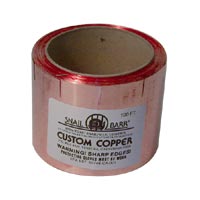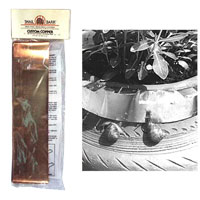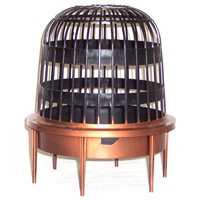Snails feasted on my bell peppers and basil over the last few days. Nothing left but leafless sticks. I checked on them first thing yesterday morning and found a large snail family sucking on the bones of my pepper plants. A couple older snails were leading the very slow getaway.
And no, I didn't kill a single one. Why? Because I am cursed with a fondness for all things tiny and cute. Have you looked at a baby snail lately? Exceedingly cute with their tiny antennae... or eyeballs... or whatever those things are... innocently searching the air. I relocated them. I have used Sluggo in moments of desperation, but I don't like witnessing the carnage and my dogs like to eat Sluggo pellets. Pet-safe or not, I really don't want them to have to digest a belly full of iron phosphate.

The perfect solution for borderline Buddhist gardeners like me is the barrier method. The problem is, that nifty 100-foot roll of copper snail barrier I wanted to buy at Berkeley Hort. the other day was 50 dollars. 50 dollars for snail fencing? I don't think I can justify that purchase at this juncture, so I'm trying to find something inexpensive around the house that will help my veggie and herb starts make it past infancy. I'm thinking bottomless milk cartons with the warning "Molluscs Beware!" written in dripping red letters. No... written in salt (if such a thing were possible). Large strawberry baskets might work too. I have none, but they might work. There's got to be something we normally recycle or throw away that I can use. Any ideas?
Anyway, replacement peppers and basil are being arranged.

Great news! Peaceful Valley Farm Supply sells 20 feet of copper snail barrier for around 13 bucks. Sold!

Holy guacamole, look what else they sell! This is exactly what I was fantasizing about and they're only $2.99 each! Just my luck that my only realized fantasy involves garden pests and not Liam Neeson, but oh well. At least I'll have reality-based peppers and basil this year thanks to copper barriers and the new Plant Defender.

I've had good luck protecting my hostas with coffee. I add one cup of coffee to each gallon that goes in the watering can and soak my plants and the mulch around them. The leaves are usually hole free through late summer.
ReplyDeleteThanks, Anthony! I usually have leftover coffee every day and will definitely give it a try with my replacement plants. That reminds me, aren't coffee grounds also supposed to repel slugs and snails? I'll go apply some to the area right now!
ReplyDeleteI think it's the caffeine that the slugs don't like. Save the coffee grounds for the compost bin since most of the caffeine goes into the coffee (and the person who drinks it).
ReplyDeleteI do like that Plant Defender idea though. I could use an Entire Garden Defender for my woodchuck problem but I don't think the neighbors would approve.
I wonder if used coffee grounds still contain enough caffeine to deter slugs and snails. I hope the answer is yes because then I can remain fully caffeinated while recycling the waste grounds. I'll give the grounds a try and report back. Leftover coffee poured on the grounds surrounding my plants might help as well.
ReplyDeleteIn the meantime, here's a snippet from an article by Miram Owen:
Do the java-jive against slugs
"According to Nature magazine, we have another weapon in the eternal battle against slugs and snails: the double espresso. Slugs and snails hate caffeine, researchers have discovered. The chemical could become an environmentally acceptable pesticide.
Robert Hollingsworth of the United States Department of Agriculture's Agricultural Research Service in Hilo, Hawaii, and his colleagues were testing caffeine sprays against the coqui frog, an introduced species that infests potted plants. They also noticed that a 1 to 2 percent caffeine solution killed nearly all the slugs and snails within two days. Concentrations as low as 0.01 percent put the pests off their dinner. A cup of instant coffee contains about 0.05 percent caffeine, and brewed coffee has more.
Coffee grounds are already recommended as a home remedy for keeping slugs and snails at bay. Grounds repel slugs, Hollingsworth found, but a caffeine solution is much more effective, he says: "Slugs turn back immediately after contacting the [caffeinated soil]." Caffeine is more effective against slugs than metaldehyde products. The United States bans metaldehyde residues in food, but classifies caffeine as safe. It may even qualify as organic, adds Hollingsworth. "I would expect caffeine applications to kill small snails and slugs, and repel the larger ones," says Hollingsworth. He envisions it being used in greenhouses and on fruit and vegetable crops."
Wow! Thanks for the plant defender link! I might buy some to protect my catmint from my kitties once I get it in the garden.
ReplyDeletecopper slug/snail tape with adhesive on one side is available for $8.25 per 15 foot roll at the Ecology Center in Berkeley (on San Pablo near Dwight). If you join as a member, you get an additional 10% discount.
ReplyDeleteThanks for the tip, Tiara! I will definitely check out the Ecology Center. Never been there!
ReplyDeleteHow do I make a 1-2 percent mixture of coffee. It seems strong if a cup has 0.05. How much of the granules do you use for a gallon of 2 percent?
ReplyDeleteThanks in advance
As far as I know, specific information (and legal certification) for home garden use is still being determined.
ReplyDeleteYou could try experimenting with different concentrations applied to soil around plants and sprayed on leaves. Seems pretty apparent a strong brew from ground beans (not instant crystals) will be more effective.
There's a possibility beneficial insects are affected as well, so we should consider the unknowns. Yes, coffee is natural, but so is nicoteine and vinegar. Just because it's natural doesn't mean it's harmless, and higher concentrations often come with higher risks.
Gardeners have been employing home methods for many years and coffee grounds and used coffee are something we would normally throw away or add to the compost bin. That's where the fun comes in when using coffee waste to battle snails and slugs. We have it, it's mild and there's probably no harm in trying it. Plus, coffee grounds add nitrogen when used as a side-dressing around plants. I haven't the foggiest idea what a foliar coffee spray adds nutritionally. Nitrogen? Nothing? Will it burn plants? I don't know. I'm going to give it a try, though, because I have snails coming out of my ears, figuratively speaking.